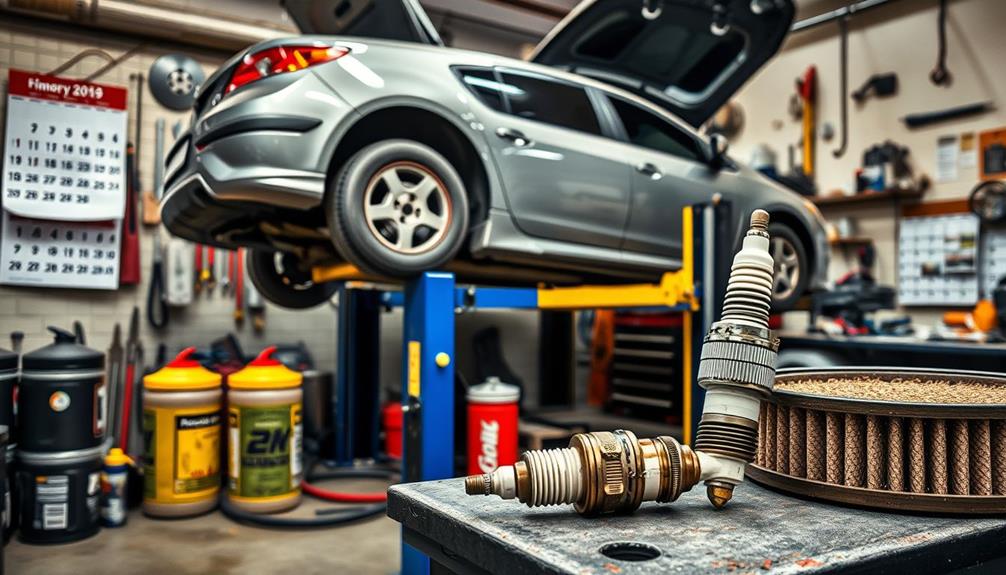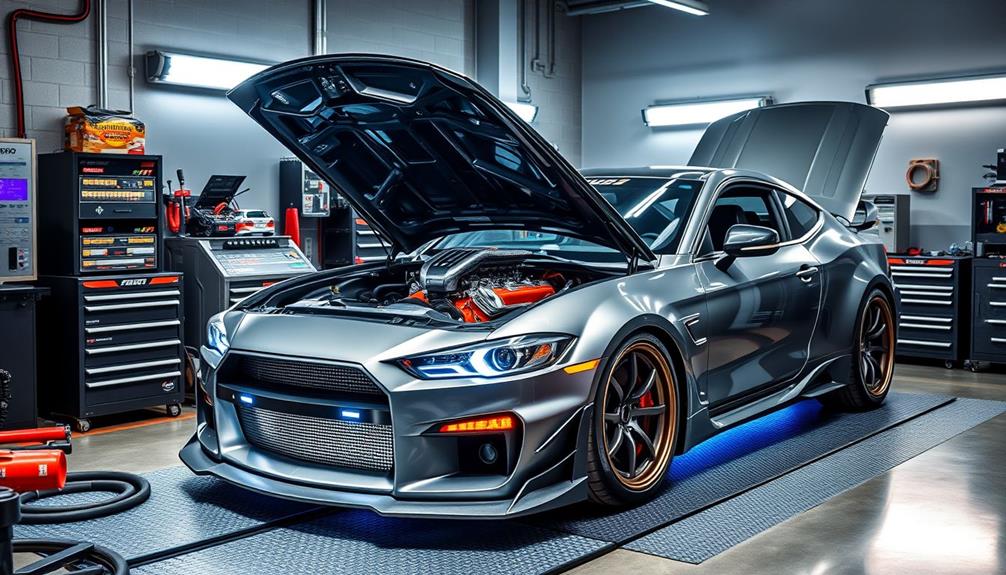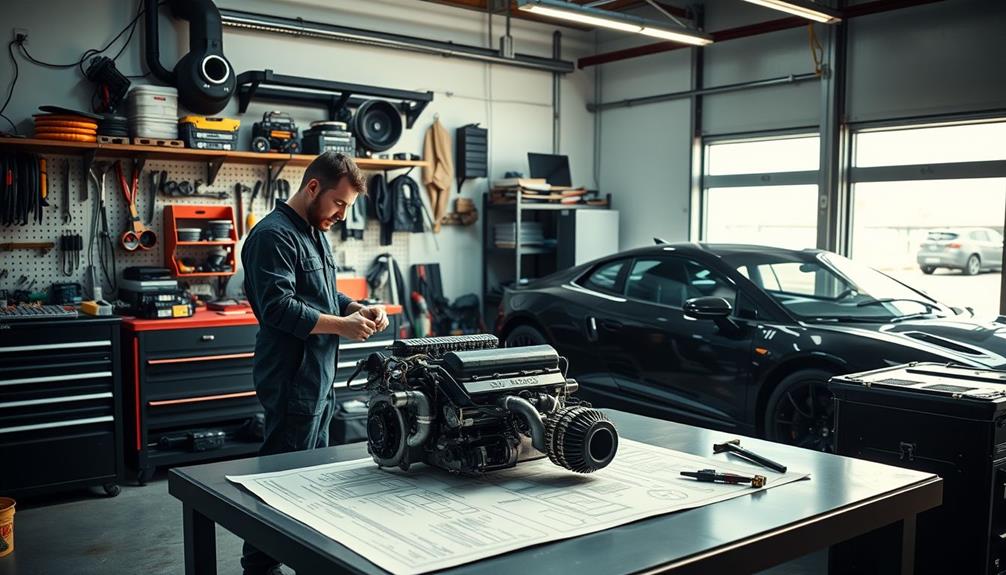To keep your car performing at its best, schedule tune-ups every 10,000 to 12,000 miles or at least once a year. This routine maintenance helps maintain engine efficiency and extend the life of your vehicle. Factors like your car's age, driving habits, and environmental conditions can affect how often you need these tune-ups. If you notice signs like decreased fuel efficiency, unusual noises, or difficulty starting, it might be time for a check-up. Staying on top of this can save you money in the long run. Discover how to tailor your schedule for maximum benefits.
Key Takeaways
- Schedule tune-ups every 10,000 to 12,000 miles or annually, depending on vehicle make and model.
- Older vehicles may require maintenance every 30,000 to 45,000 miles for optimal performance.
- Driving conditions, such as harsh weather or stop-and-go traffic, can necessitate more frequent tune-ups.
- Monitor for signs like decreased fuel efficiency or dashboard warning lights to determine if a tune-up is needed sooner.
- Always refer to the manufacturer's specifications for recommended maintenance intervals tailored to your vehicle.
Understanding Car Tune-Ups
Regular car tune-ups are crucial for maintaining your vehicle's performance and longevity. A car tune-up typically involves routine maintenance tasks, such as changing engine oil, inspecting spark plugs, and checking various filters. These tasks are essential for ensuring peak vehicle performance and can prevent minor issues from turning into major problems.
Modern tune-ups focus on basic maintenance rather than extensive overhauls. Most adjustments are managed automatically by computer-based systems in newer vehicles, making it easier for you to keep track of your tune-up schedule. By adhering to your manufacturer guidelines, you can effectively extend your vehicle's lifespan.
Key components checked during a tune-up include engine oil, air filters, spark plugs, brake systems, and tire pressure. All these elements greatly impact fuel efficiency and vehicle safety.
Neglecting regular maintenance can lead to decreased fuel efficiency, increased repair costs, and potential voiding of manufacturer warranties due to lack of documented maintenance.
Recommended Tune-Up Frequency
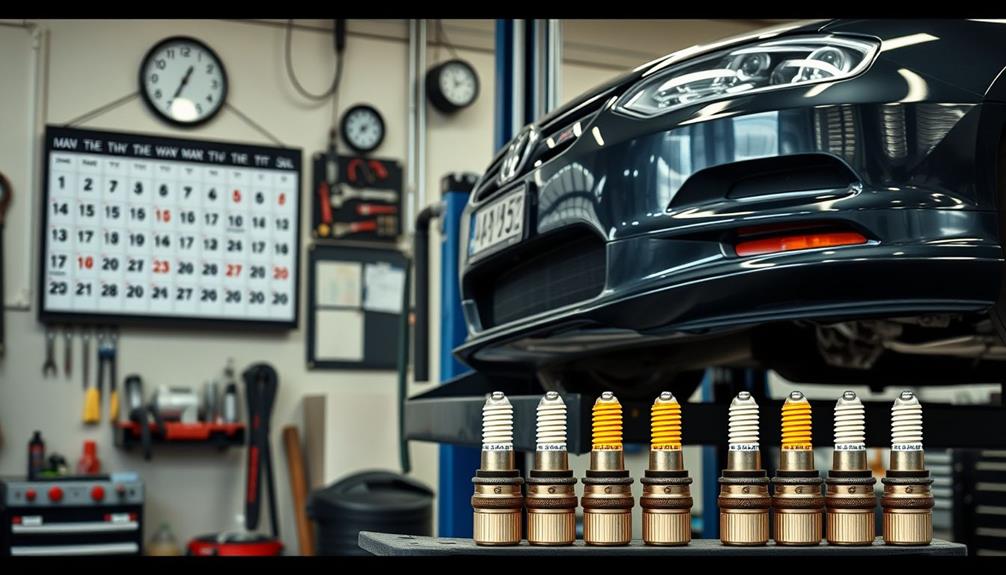
Knowing when to schedule a tune-up can keep your vehicle running smoothly and prevent costly repairs down the road. Generally, you should follow a tune-up schedule that suggests a regular car tune every 10,000 to 12,000 miles or annually, as outlined in your owner's manual.
However, the exact frequency can vary based on your vehicle's make and model. For older vehicles, especially those with over 30,000-45,000 miles, more frequent tune-ups may be necessary due to increased wear and tear.
If you frequently drive in harsh conditions, like stop-and-go traffic or extreme weather, consider adjusting your vehicle maintenance routine accordingly.
Look out for signs to watch, such as decreased engine performance, unusual noises, or trouble starting your vehicle. These indicators may suggest it's time for a professional mechanic to take a closer look.
Additionally, remember that oil changes are vital, as they contribute to your car's overall health and efficiency. Scheduling tune-ups before long trips or seasonal changes can help prevent potential issues and guarantee your vehicle runs at its best.
Factors Affecting Tune-Up Schedule
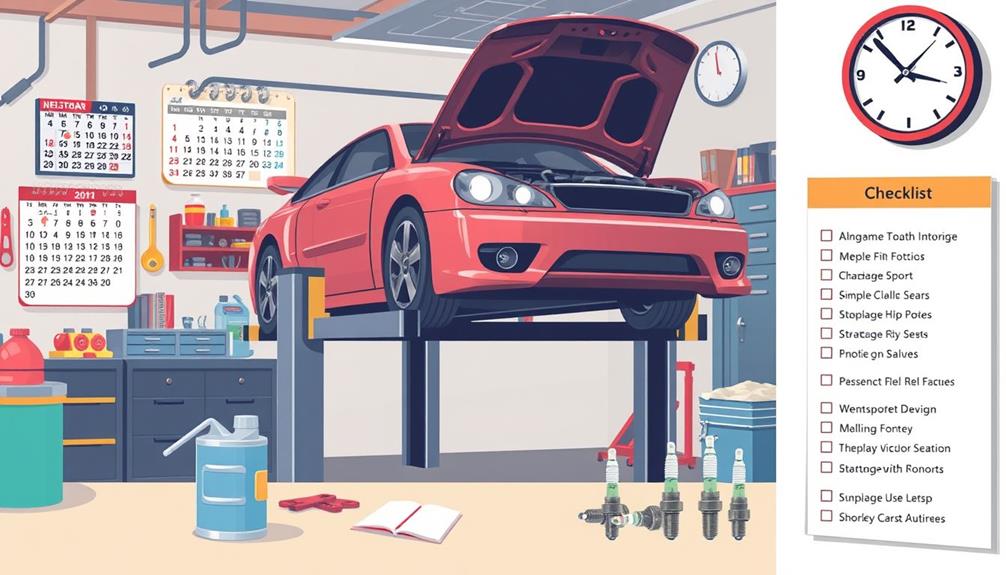
When considering your car's tune-up schedule, several key factors can influence how often you should seek maintenance.
The age and mileage of your vehicle are vital; older cars or those with over 30,000 to 45,000 miles typically require more frequent engine maintenance.
Additionally, your driving habits matter. If you often find yourself in stop-and-go traffic or driving aggressively, you might need to schedule tune-ups more regularly to maintain peak performance.
Manufacturer specifications outlined in your vehicle owner's manual provide essential guidance on recommended intervals. Always refer to it for tailored advice.
Environmental factors can also play a role; if you frequently drive in dusty or humid conditions, your engine may accumulate buildup faster, necessitating more regular maintenance.
Signs Your Car Needs a Tune-Up
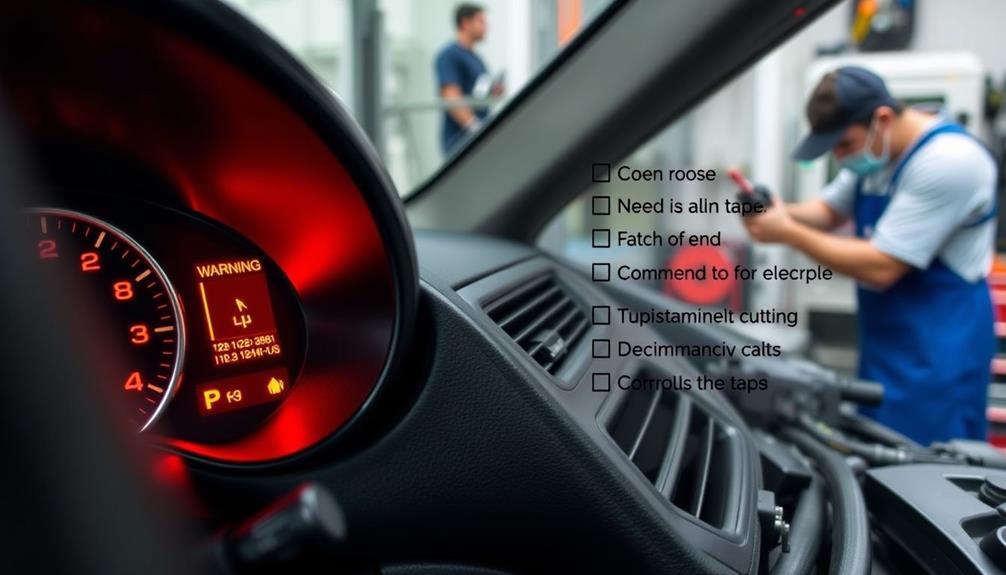
Often, car owners overlook the signs that indicate it's time for a tune-up, which can lead to more significant issues down the road. One of the most telling signs is a decrease in fuel efficiency. If you notice your car consuming more fuel than usual, it's likely time for some maintenance.
Unusual noises or vibrations while driving can also signal underlying mechanical problems, suggesting a tune-up might be necessary. Keep an eye on your dashboard warning lights, especially the check engine light. This often indicates that immediate diagnostics and possible tune-up services are required.
If you struggle to start your engine or experience rough idling, these are definite warning signs that your vehicle needs attention. Additionally, if you find that your car's acceleration feels sluggish or its overall performance isn't what it used to be, it's a strong indication that a tune-up is in order.
Cost Considerations for Tune-Ups

Understanding the costs associated with a car tune-up is crucial for maintaining your vehicle without breaking the bank. The national average for a basic tune-up ranges from $40 to $150, but specialized services can run between $200 and $800, depending on complexity.
Thorough tune-ups often exceed $300, especially for luxury or older vehicles with intricate systems. Prices can vary greatly based on your location, so it's smart to check your vehicle owner's manual for recommended maintenance schedules and guidelines.
Labor costs play a considerable role in the total expense, reflecting the mechanic's expertise and time needed for the service. To save money and avoid costly repairs down the road, request estimates from multiple repair shops before you proceed.
Staying proactive about your tune-up schedule can enhance your vehicle's performance and efficiency while extending engine life. If your Check Engine Light comes on, it's an immediate sign to address issues, which may include replacing various components.
Following the manufacturers' recommendations will help guarantee a smooth driving experience and keep unexpected costs at bay.
Frequently Asked Questions
How Long Should You Go Between Tune Ups?
You should schedule tune-ups every 30,000 to 100,000 miles, depending on your vehicle's specifics. It's wise to check your owner's manual and consider factors like driving conditions to maintain peak performance. Additionally, if you notice any changes in your car’s performance or fuel efficiency, it may be a sign that a tune-up is needed sooner. Ignoring these signs could lead to more severe and costly issues down the line. Ultimately, staying on top of your car tuneup duration is essential for maintaining the longevity and reliability of your vehicle.
What Is the Recommended Tune-Up Interval?
Think of your car like a garden; regular care keeps it thriving. For peak performance, you should tune-up every 10,000 to 12,000 miles, or as your owner's manual suggests, to guarantee everything runs smoothly.
What Is the Best Interval for Car Service?
For ideal performance, you should service your car every 30,000 to 100,000 miles, depending on its make and model. Regular tune-ups every 6 months or 5,000 miles keep your engine running smoothly and efficiently.
How Often Should You Get a Toon Up?
Think of your car as a finely tuned instrument; it needs regular attention. You should get a tune-up every 10,000 to 12,000 miles or annually, especially if you notice signs of wear or warning lights.
Conclusion
In the grand journey of car ownership, regular tune-ups are your vehicle's pit stops, ensuring it runs smoothly and efficiently. By sticking to the recommended schedule and being aware of the signs that your car needs attention, you can keep it in top shape and avoid costly repairs down the road. Don't let neglect turn your ride into a clunker—treat your car with the care it deserves, and it'll reward you with countless miles of joyful driving.
